|
|
Selection of flyers & handbills from Placebo shows, 1995 - 2004: |
FEW CARS DOT THE BRAND NEW PARKING LOT AT THE MANILA DUNES COMMUNITY CENTER on a quiet Thursday evening; more will arrive soon for the monthly meeting of the Manila Community Services District board, the de facto town council. Tobin Poppenberg, a 23-year-old who says he lives "a stone's throw" from the center, shows up on foot. He has heard that the youth organization known as the Placebo could face eviction from the community center due to noise complaints. While he has only attended a few of the rock shows the group puts on most weekends, he has drafted a letter in support of the group and wants to speak on their behalf at the meeting. "Young people under the age of 21 don't have other places to go to see music for the most part," he says, emphasizing the fact that Placebo shows are kept drug and alcohol free. "Even for those of us who are over the age of 21, it's important to have a safe place that's not centered around the use of alcohol where people can enjoy music. "Also there are young people in the Manila community who don't drive, who have an opportunity to walk or ride their bikes to attend shows here," he adds. Another Manila resident, Devon O'Leary [photo at right] , arrives, also on foot. He says he's been involved with Placebo since he was 16. "I showed up for a show and didn't have any money so they put me to work, and I just kept coming back."
No longer at that "impressionable age," O'Leary has become one of a dozen or so Placebo board members. Several more of his colleagues from the board arrive, among them Abe Ray [photo below left] , the tall, sandy-haired 24-year-old who founded the organization. They will be joined by parents of Placebo members and others from Manila to speak out in support of keeping the Placebo in the only permanent home it's had in almost five years.
Roots When Abe Ray was a high school student in Benicia, he hung out and volunteered at a couple of all-ages venues: One was a warehouse space where a group of high school students and recent grads put on occasional shows, the other a more formal youth group that ran concerts at an old theater in town or the local Veteran's Hall -- both had strict policies forbidding drugs and liquor of any kind. Both outfits were loosely based on a legendary youth-run club in North Berkeley known as the 924 Gilman Street Project. Placebo board member Julie Ryan said she was inspired to join the local organization because of her experience at Gilman when she was a teenager.
[photo at right: Julie Ryan and Ryan Emenaker] When Ray moved to Arcata in 1997 to attend Humboldt State, he found a general lack of venues where kids under 21 could hear live music. There were exceptions: A group called Landslide Collective was doing rock shows, but mostly in private homes. Another group of kids, working under the auspices of a nonprofit called Tiffany's Garden for Children, was organizing shows to raise funds for the Arcata Skate Park. Ray attended some of the events, but was not involved in running them. "I eventually started a band, Fiddlestick," said Ray. "After we'd played for a while, we just decided that Arcata needed a more permanent music venue, one that catered to all ages and brought bands into the area." In the spring of 1999, Ray and Fiddlestick's singer, Thoren Vidala, took out loans from their parents to pay rent for a warehouse space on South G Street in Arcata. Vidala came up with the name Placebo, chosen to indicate the drug-free environment they insisted on at the venue. "We didn't really know what we were doing; we just did it," Ray admitted with a laugh. "Up 'til then, I was basically just a kid who went to shows. We hooked up with some of the people from Landslide who knew how to put on shows; they helped us make it work." Word got around quickly, both in the local youth music scene and among touring indie rock bands; by summer the Placebo was putting on three or four shows a week, mixing out-of-town acts with locals. Among the kids who heard about the fledgling venue was my own son, Spencer, then 15. I had heard enough about the place to know that one of the draws was the fact that it was essentially a grownup-free environment. My wife and I agreed that he could go, as long as I could check the place out, to see the set-up and find out exactly who was running the place.
An interior door led into a large dark space where a band was tuning up in one corner. Stairs led to a loft where couches provided respite from the dance floor. There were no adults in evidence; the closest thing was then 19-year-old Abe Ray. He reassured me by detailing the rules of the establishment: zero tolerance for alcohol, drugs and any sort of violence. "From the beginning we had kids who were all about having fun -- but not being overly stupid," said Ray in retrospect. Things rolled along on South G through most of the summer of '99, until one evening when the kids showed up at the warehouse to find a message from the police posted on the front door. "There was a note on the back of one of our flyers basically saying, `Do not have the show tonight or you will be shut down forever,'" Ray recalled. While there had been no formal complaints, once the police learned about what the kids were doing, running an establishment without permits, the jig was up. "The city told us we needed a business license and said we weren't in a correctly zoned area. We went to Tiffany's Garden of Children and they put us under their nonprofit umbrella, so we were a legitimate [business] organization -- but we still needed to deal with the permits and the zoning [issue] in order to do business in the space." Ray and company wanted to go legit, but found that jumping through the requisite hoops proved too expensive. Since the warehouse was near the Arcata Marsh, and thus within the coastal zone, the zoning change application fee alone was $600, then there was the matter of rest rooms; the building had one and the city wanted multiple stalls. "The city was nice enough telling us what we had to do; we just couldn't do it. We moved out and the whole thing just died." By the book
This time the plan was to do everything by the book. "We wanted to create something that would survive," said Ray, "and we knew that a nonprofit was the way to go. That way it's basically something that's built for the community, and if the community wants it, it will thrive." Realizing that achieving 501(c)(3) nonprofit status was a long drawn-out process, Ray approached the Ink People for help. The group's executive director, Libby Maynard, welcomed them under that organization's umbrella, and the Humboldt County Youth Arts Program was born. (Despite the new official-sounding name, everyone persisted in calling it the Placebo.) Nonprofit status allowed the group to write grant applications and receive donations and enabled them to rent city buildings while searching for a permanent site. The city of Arcata offered the use of the D Street Neighborhood Center for fund-raising dances. "All we had to pay for was insurance," said Ray. But after 9-11, the insurance kept getting more and more expensive. There was also a bit of resistance from neighbors who expressed concern about late night noise levels and worried about teens hanging around outside the dances. A neighborhood meeting was arranged where the kids allayed most of the fears by agreeing to some basic ground rules, soundproofing improvements were arranged, along with self-policing to ensure that both outside activity and the noise were kept in check. Meanwhile, the search was on for a permanent location, a space where the group could institute ambitious plans. The idea was to expand from simply putting on music events to running a coffee shop-style hang-out that could be open after school, with practice space for bands, a recording studio, an art studio, a photo lab and a gallery. Essentially they were proposing a youth-run teen center. The group looked into a number of potential rentals in Arcata. A space on the plaza seemed like a good possibility, but the landlord ended up renting to another party; a space in Sunnybrae fell through, as did plans for a space on M Street.
The bottom line: While community organizations were supportive, no landlord was willing to take a chance renting to a bunch of kids. The rock shows continued with the group experimenting with other venues; HSU facilities were used occasionally with support from a campus club. A series of shows was held at the Arcata Denny's in a back room sports bar that went alcohol-free for one night a week during Placebo events. Dances at the neighborhood center continued, but the insurance kept going up. Eventually, said Ray, the insurance fees alone were running $200 a night, which did not leave much for traveling bands who worked for a percentage of the door -- after expenses. "We knew we had to lower our overhead; that's when renting a space in Manila started making more sense," said Ray. With a long-term rental agreement, the insurance would be based on a yearly rate rather than nightly. Even with rent, the percentage for the musicians would be bigger and most nights there might even be money left over to set aside for the future. The group had already run occasional shows in a converted cafeteria at the Manila Community Center. It was suggested that a more permanent arrangement was possible. About a year ago, with encouragement from the Manila Parks and Recreation Department, the Placebo entered into a month-by-month rental agreement for a space at the center. "Kudos to the community center for recognizing that this could be really good for the kids out there," said Emenaker. Ryan Carlile echoed his sentiments. "They opened their arms. That's the No. 1 reason we're there. They approached us, saying they thought it would be a good place for us." In Manila The Manila Community Center complex has the unmistakable earmarks of a California school built in the '50s or '60s -- two parallel wings have a breezeway on one side and a wall of windows on the other. It was, in fact, a school affiliated with the Arcata Elementary School District until late in the '60s, when it closed for lack of enrollment. Today the facility is home to a wide range of organizations serving the Manila community: everything from a preschool run by North Coast Children's Services and a branch of Mattole Charter School called Dunes of Discovery, to classes for Northern Humboldt Adult School and an MCSD-funded program called Manila Teenship with after-school programs including art classes and computer access. Initially the Placebo had rented the center's largest room, a former cafeteria space converted into a hall for dances and other gatherings.
"We saw a number of teens from the Manila community who were interested in getting involved, along with older youth in the early-20s category, all of them hardworking and dedicated. I saw it as a good match," she said. The only downside was what Prosser termed "the noise issue" -- "music that's too loud running too late." There weren't a lot of complaints from the neighbors, but as Prosser explained, the service district staff takes any complaint seriously. "When the board hears from people in the community that they are not happy, they listen. When people have issues, we try to resolve them," she continued. In March of this year the Manila Community Services District board of directors gave the Placebo board a letter noting a series of community concerns, mostly related to noise -- not just music emanating from the building during concerts, but noise in the parking lot as concert-goers arrived and departed. The Placebo kids vowed to be proactive in addressing the issues. They nailed up more soundproofing in the room and added noise-blocking barriers outside the door. In addition, a community outreach program was established, with Placebo volunteers going door-to-door in the neighborhood to listen to people's concerns; a getting-to-know-you community gathering was held. In the midst of their multi-pronged attempt at addressing the problems came a meeting of the MCSD board on April 15 where the noise problem was addressed. After some debate, an edict was issued, a tentative eviction notice giving the group 60 days to satisfy the neighbors' noise complaints. "That was a complete shock to us," said Carlile, "that it would come down to a 60-day memorandum. We talked at the meeting for something like an hour and a half. I don't think I've ever been on the spot like that before." "Dan [Edrich] was the most vocal," said Emenaker. "He kept restating, `Do we want this place to be a venue or not?' He basically thinks the whole [community center] should be shut down at 5 p.m. every day. The board's position was that the center is a venue, and has been one for years, so that's not the real issue. [There are other groups who use the center after 5.] They wanted to evaluate [our use] purely on the sound issue. It was difficult because they have never really had an established policy on noise." (Edrich did not return repeated telephone calls. However, a board member confirmed Emenaker's characterization of what Edrich said at the meeting regarding the community center.) With some trepidation, the Placebo board members accepted the 60-day deadline -- not that they had a choice. They vowed to continue improving relations with offended neighbors, but the April 16 complaints -- filed about a show the following night -- demonstrated that the issues could not be solved overnight. Plans were drafted to create a new entry door on the side of the room away from the neighbors, to alleviate a problem with noise escaping when people enter or exit. Pierson Building Center donated further soundproofing material. Since comments at the meeting made it apparent that loud music was not the sole problem, a flyer was drafted instructing concert attendees on parking lot etiquette. Enforcing the rules is the job of kids like 17-year-old Samantha Fox, a Manila resident who play bass in a punk band and serves as a Placebo board member. ![[Samantha Fox playing bass guitar with singer, drummer and guitarist]](cover0527-samanthaband.jpg) Above: Samantha Fox (R) playing with her band Talent Show "I work the door sometimes and I do security a lot. You make rounds and make sure people aren't drinking, making too much noise or stuff like that," she explained. There are, in fact, consequences for offenders. Anyone who attends a show must join the Placebo and sign a pledge to follow the rules, including, "no drinking, drug use or vandalism in or around the venue." Those who break the rules can lose their membership and the right to go to future shows. But, according to Fox, just asking people to straighten up is usually enough. "Nobody who works as at the Placebo gets paid. We volunteer so that other people can have fun, and we have fun too. People recognize that if they do something like vandalizing the bathroom, it ruins it for everybody." All of those efforts and more were brought up when the group's tentative eviction was revisited at the Manila board's May 20 meeting. The majority of the audience was there in support of the Placebo, and a number of people -- parents, board members and other community members -- spoke with passion about the importance of the organization and its mission. None of the complaining neighbors came to the meeting. Board member Nancy Ihara mentioned that she had called one of the more vocal neighbors -- not Edrich -- and found that he had no further complaints; in fact he was not even aware that the Placebo had put on further shows every weekend in the month of May. The closest thing to a negative comment came from Manila poet Jerry Martien, who suggested that that the board should focus on what he termed "off-site impacts" of the after-hours use of the community center rather than the value of the youth group. When the time came for a vote, the board was unanimous -- the eviction notice was lifted -- but with the reminder that the group's rental agreement is, and always has been, on a month-by-month basis. It seemed the Placebo was home free -- at least for the time being. Next on the agenda was permission for the Placebo to create a new door in the south wall of their space. That too was approved unanimously; the board even agreed to reimburse them for the cost. Emenaker noted that the price would be relatively low since Arcata City Councilmember Dave Meserve, a long-time Placebo supporter who works as a contractor, has volunteered his labor for the project. "I think the board has been impressed by the effort the kids put into finding a solution to the problem," Prosser said after the meeting. "That's what community centers are all about: finding solutions to problems so you can offer the kinds of things that people want and enjoy." Epilogue Saturday, two nights after the eviction notice was lifted, it's showtime once again at the Placebo. The "Randy Pony Tour" is here from Olympia, Wash. The vanload of alt. folk-rockers includes a band called Liarbird and two singer/songwriters: Tara Jane O'Neil and Mirah. In nine days they've done nine shows, all of them at all-ages venues. ![[Mirah singing and playing guitar, Themba playing upright bass]](cover0527-mirah.jpg) Mirah with Themba of Liarbird
Mirah with Themba of Liarbird"We've been so fortunate to be able to play places like this," says Liarbird's lead singer, Kanako. "It's such a different environment [from playing in bars]. The independent music scene has always been driven by youth, and a lot of our fans are underage. Who wants to play in a bar? They're stinky and noisy and people aren't paying attention half the time." Liarbird's music is far from loud, closer to folk than rock. It's easy to see why they would prefer Placebo to a raucous bar: Kanako's introspective lyrics demand the close consideration the attentive audience gives them. The same could be said for Mirah, who strums a guitar accompanying songs exuding sweetness and light. As the show nears its close, she invites her fellow travelers back to the stage to join her in a swinging quasi-tango. As the song ends, the clock strikes 12. Mirah knows about the sound curfew, but the crowd wants more. She wonders aloud, "Do you suppose the neighbors would mind if I sang one more song a cappella?" No one seems to think they would, so she does just that, leading a sing-along on her reworking of an old spiritual, "I Am the Light of This World." The crowd joins in, then the song ends -- it really is time to go home. The gathering breaks up, kids filing out into the night, some of them perhaps contemplating the light of this world. My guess is the Placebo kids are thinking in less lofty terms. Lingering after the crowd left, they set about cleaning up their space, and talk turns to who's doing what at the next show. While the stragglers depart Julie Ryan patrols the parking lot with a mag light, picking up pop cans and food wrappers. Some might find the work menial and thankless, but she doesn't. She figures the show was worth it. "Music is a great analgesic, it allows you to forget your troubles for a few hours," she says. But there's more to it than that. "For me personally, a lot of it is about giving something back," she continues. "I think back to when I was younger and having a positive safe place to just hang out. I want other kids to have that, too. It's important." |
IN THE NEWS | GARDEN | ART BEAT | THE HUM | CALENDAR
Comments?
© Copyright 2004, North Coast Journal, Inc.

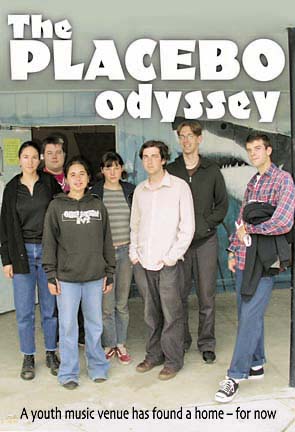

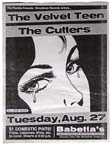
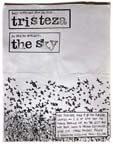
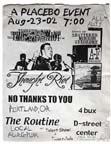
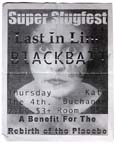
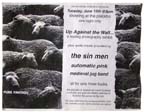
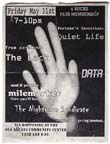
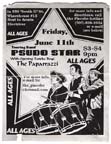
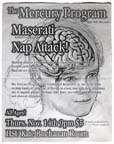
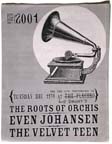
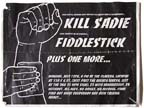
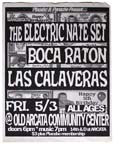
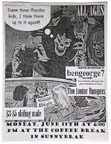

![[Devon O'Leary]](cover0527-devon.jpg) O'Leary,
now 21, credits the organization with keeping him out of trouble
in his teen years. "Most of the kids who come to Placebo
are at an impressionable age," he points out. "There's
a lot of ways for kids that age to go astray and end up in a
really sad situation. The Placebo, although it doesn't push anyone
in any particular direction, is the sort of environment where
kids can make the right decisions on their own -- and get some
support. Maybe they want to do something with art or music, or
get into volunteerism; there's someone who will say, `Let me
help you with that,' instead of saying, `This is what you have
to do.'"
O'Leary,
now 21, credits the organization with keeping him out of trouble
in his teen years. "Most of the kids who come to Placebo
are at an impressionable age," he points out. "There's
a lot of ways for kids that age to go astray and end up in a
really sad situation. The Placebo, although it doesn't push anyone
in any particular direction, is the sort of environment where
kids can make the right decisions on their own -- and get some
support. Maybe they want to do something with art or music, or
get into volunteerism; there's someone who will say, `Let me
help you with that,' instead of saying, `This is what you have
to do.'"![[Abe Ray]](cover0527-aberay.jpg) One of the
neighbors who has had problems with the organization in the year
or so it's been in Manila is Dan Edrich, a former community services
board member. In a written complaint, Edrich said that on April
16 he "was awoken [sic] by noise (music) from the community
center [that] continued 'til after midnight." Another unsigned
complaint objects to "very loud noise" the same night.
Both were filed within days of a formal warning issued to the
Placebo by the services board demanding that the group deal with
noise problems and make peace with its neighbors.
One of the
neighbors who has had problems with the organization in the year
or so it's been in Manila is Dan Edrich, a former community services
board member. In a written complaint, Edrich said that on April
16 he "was awoken [sic] by noise (music) from the community
center [that] continued 'til after midnight." Another unsigned
complaint objects to "very loud noise" the same night.
Both were filed within days of a formal warning issued to the
Placebo by the services board demanding that the group deal with
noise problems and make peace with its neighbors.![[Julie Ryan and Ryan Emenaker]](cover0527-julieryan.jpg) "The
place has been going as a volunteer-run nonprofit for something
like 17 years now," said Ryan. "I loved that it was
drug and alcohol free, particularly after going to un-checked
venues. Gilman was a lot safer space to be in, and as a female
it was cool to be able to hang out without being sexually harassed."
"The
place has been going as a volunteer-run nonprofit for something
like 17 years now," said Ryan. "I loved that it was
drug and alcohol free, particularly after going to un-checked
venues. Gilman was a lot safer space to be in, and as a female
it was cool to be able to hang out without being sexually harassed."![[Willoughby Arevalo]](cover0527-willoughby.jpg) The
South G space was set among a nondescript row of garages; entering
a small room upfront, we were greeted by Willoughby Arevalo [photo at left] ,
a volunteer taking money at the door. Just 14 at the time, he
was someone I already knew as a good kid. "It's totally
safe here," he assured me, and he was more than willing
to find another teen to watch the door so he could give me a
tour.
The
South G space was set among a nondescript row of garages; entering
a small room upfront, we were greeted by Willoughby Arevalo [photo at left] ,
a volunteer taking money at the door. Just 14 at the time, he
was someone I already knew as a good kid. "It's totally
safe here," he assured me, and he was more than willing
to find another teen to watch the door so he could give me a
tour.![[Ryan Carlile]](cover0527-ryan.jpg) Two
years passed before the Placebo concept was resurrected. Ray
brought the idea up with his friend Ryan Carlile [photo at right] ,
another HSU student, and a music lover. "Ryan said he
was into it, and we started asking other people. We put up some
flyers announcing a meeting and we were on our way again."
Two
years passed before the Placebo concept was resurrected. Ray
brought the idea up with his friend Ryan Carlile [photo at right] ,
another HSU student, and a music lover. "Ryan said he
was into it, and we started asking other people. We put up some
flyers announcing a meeting and we were on our way again."![{Ryan Emenaker playing guitar]](cover0527-ryanguitar.jpg) Placebo
board member Ryan Emenaker [photo
at left] , a Humboldt State University
grad student who is also a member of the rock band Winston Smith,
explained, "We had a lot of people tell us, `You know, what
you're doing is great. I really support you; you're wonderful,
but I'm not going to rent to you.' It comes back to this perception:
People think it's a wonderful concept if we can pull it off,
but don't really believe that youth can be responsible, or that
rock `n' roll music is necessarily a good thing. The thought
is that punk rock or rock `n' roll is nothing more than destroying
things and messing things up, or being drunk and screwed up."
Placebo
board member Ryan Emenaker [photo
at left] , a Humboldt State University
grad student who is also a member of the rock band Winston Smith,
explained, "We had a lot of people tell us, `You know, what
you're doing is great. I really support you; you're wonderful,
but I'm not going to rent to you.' It comes back to this perception:
People think it's a wonderful concept if we can pull it off,
but don't really believe that youth can be responsible, or that
rock `n' roll music is necessarily a good thing. The thought
is that punk rock or rock `n' roll is nothing more than destroying
things and messing things up, or being drunk and screwed up."![[Bev Prosser at her desk]](cover0527-prosser.jpg) Bev
Prosser [photo at right] , who serves at coordinator for the Manila Parks
and Recreation Commission, welcomed "the Placebo kids,"
as she calls them. The bustling 50-ish mom, who exudes the air
of a mother hen, facilitated a more permanent rental agreement
between the youth group and the district.
Bev
Prosser [photo at right] , who serves at coordinator for the Manila Parks
and Recreation Commission, welcomed "the Placebo kids,"
as she calls them. The bustling 50-ish mom, who exudes the air
of a mother hen, facilitated a more permanent rental agreement
between the youth group and the district.